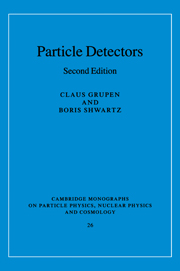Book contents
- Frontmatter
- Contents
- Preface to the second edition
- Preface to the first edition
- Introduction
- 1 Interactions of particles and radiation with matter
- 2 Characteristic properties of detectors
- 3 Units of radiation measurements and radiation sources
- 4 Accelerators
- 5 Main physical phenomena used for particle detection and basic counter types
- 6 Historical track detectors
- 7 Track detectors
- 8 Calorimetry
- 9 Particle identification
- 10 Neutrino detectors
- 11 Momentum measurement and muon detection
- 12 Ageing and radiation effects
- 13 Example of a general-purpose detector: Belle
- 14 Electronics
- 15 Data analysis
- 16 Applications of particle detectors outside particle physics
- Résumé
- 17 Glossary
- 18 Solutions
- Appendix 1 Table of fundamental physical constants
- Appendix 2 Definition and conversion of physical units
- Appendix 3 Properties of pure and composite materials
- Appendix 4 Monte Carlo event generators
- Appendix 5 Decay-level schemes
- Index
12 - Ageing and radiation effects
Published online by Cambridge University Press: 19 October 2009
- Frontmatter
- Contents
- Preface to the second edition
- Preface to the first edition
- Introduction
- 1 Interactions of particles and radiation with matter
- 2 Characteristic properties of detectors
- 3 Units of radiation measurements and radiation sources
- 4 Accelerators
- 5 Main physical phenomena used for particle detection and basic counter types
- 6 Historical track detectors
- 7 Track detectors
- 8 Calorimetry
- 9 Particle identification
- 10 Neutrino detectors
- 11 Momentum measurement and muon detection
- 12 Ageing and radiation effects
- 13 Example of a general-purpose detector: Belle
- 14 Electronics
- 15 Data analysis
- 16 Applications of particle detectors outside particle physics
- Résumé
- 17 Glossary
- 18 Solutions
- Appendix 1 Table of fundamental physical constants
- Appendix 2 Definition and conversion of physical units
- Appendix 3 Properties of pure and composite materials
- Appendix 4 Monte Carlo event generators
- Appendix 5 Decay-level schemes
- Index
Summary
Life would be infinitely happier if we could only be born at the age of eighty and gradually approach eighteen.
Mark TwainAgeing effects in gaseous detectors
Ageing processes in gaseous detectors are about as complicated and unpredictable as in humans.
Avalanche formation in multiwire proportional or drift chambers can be considered as a microplasma discharge. In the plasma of an electron avalanche, chamber gases, vapour additions and possible contaminants are partially decomposed, with the consequence that aggressive radicals may be formed (molecule fragments). These free radicals can then form long chains of molecules, i.e., polymerisation can set in. These polymers may be attached to the electrodes of the wire chamber, thereby reducing the gas amplification for a fixed applied voltage: the chamber ages. After a certain amount of charge deposited on the anodes or cathodes, the chamber properties deteriorate so much that the detector can no longer be used for accurate measurements (e.g. energy-loss measurements for particle identification).
Ageing phenomena represent serious problems for the uses of gaseous detectors especially in harsh radiation environments, such as at future high-intensity experiments at the Large Hadron Collider at CERN. It is not only that gas mixtures for detectors have to be properly chosen, also all other components and construction materials of the detector systems have to be selected for extraordinary radiation hardness.
- Type
- Chapter
- Information
- Particle Detectors , pp. 346 - 359Publisher: Cambridge University PressPrint publication year: 2008



